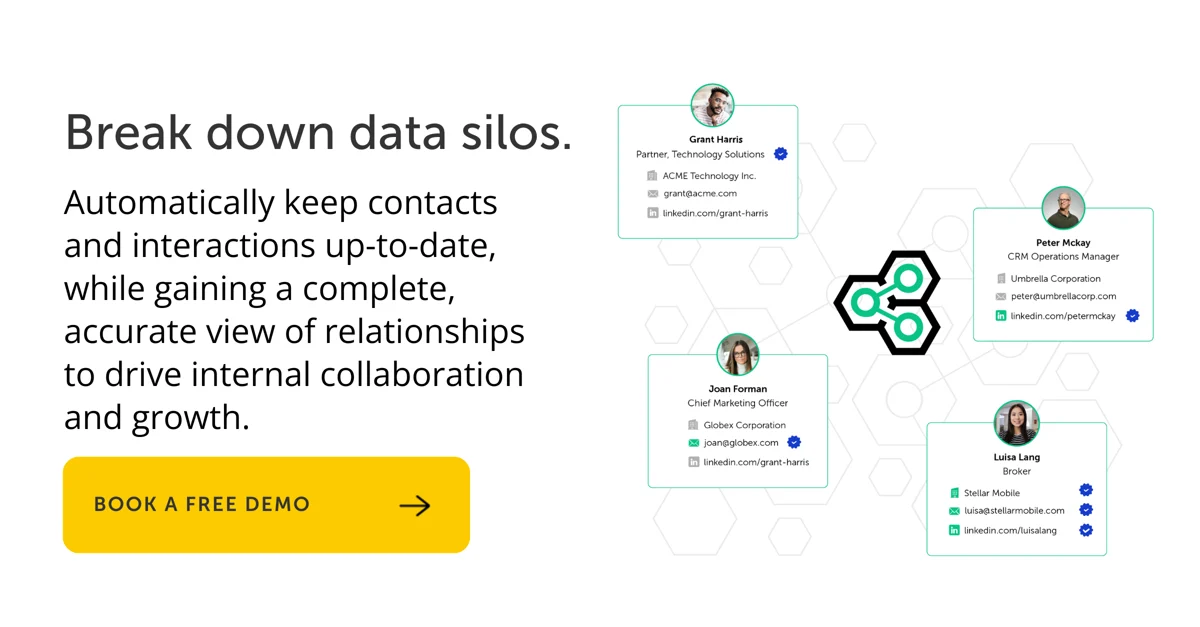CRM transformation projects are complex and can take years to fully realize. However, once your CRM transformation project resumes, hitting the ground running and accelerating time to value becomes critical.
Many firms have a clear goal in mind: streamlined processes, deeper client insights, and more efficient use of technology. Yet, despite the best-laid plans, delays are common, and the anticipated benefits of digital transformation can remain frustratingly out of reach. If your firm’s progress has slowed, you’re not alone.
The question is, how can you overcome these delays and accelerate time to value once the project gets back on track?
The answer lies in your contact and relationship data. Before launching a new CRM or introducing new technology platforms, it’s crucial to ensure your data is ready for a transformation. By centralizing your contacts and relationships now, you can create the foundation for a digital transformation framework that allows your firm to seize opportunities faster and start delivering results as soon as the project restarts.
What is a digital transformation framework?
A digital transformation framework is a structured plan that guides how an organization adopts new technology, streamlines processes, and uses data to improve performance. It defines the steps, systems, and data foundations required to support initiatives such as a successful CRM implementation plan.
A strong framework begins with a centralized data strategy that ensures contact and relationship information is accurate, complete, and accessible. This level of data readiness enables teams to generate meaningful relationship intelligence by uncovering who knows whom, the strength of those connections, and the opportunities most likely to drive engagement and revenue.
By starting with clean, centralized data, organizations reduce implementation risk, increase CRM adoption, and accelerate time to value from digital transformation efforts.
Table of contents
Why data centralization is core to a digital transformation framework
A successful digital transformation framework—and by extension, a CRM transformation—comes down to thinking about how your firm operates and manages its data to drive better client outcomes. It requires giving careful thought to your firm’s overarching data management strategy. Even the most advanced tools won’t deliver results if they’re layered on top of fragmented or incomplete information.
For many firms, fragmented data is one of the biggest obstacles to progress. Client and contact information is often scattered across CRM systems, email accounts, spreadsheets, or even personal records maintained by individual team members. Centralizing this data before a transformation resumes eliminates inefficiencies, provides immediate access to actionable insights, and positions your team to deliver value right out of the gate.
By proactively consolidating your data now, you can ensure that your CRM transformation project isn’t held back by outdated information or inefficiencies and that your team has the tools and insights they need to drive results from day one.
Proactively centralizing your relationship data
One of the best ways to prepare ahead of time for an upcoming CRM transformation project is to centralize your relationship data across your firm, creating the foundation for a digital transformation framework.
Here’s why it matters:
- It creates CRM readiness: Clean, organized data is a prerequisite for CRM implementation. Without centralized data, CRM adoption is likely to face delays as users struggle with incomplete information or incorrect contact records. Starting with centralized data helps streamline the launch of a new CRM, minimizing disruption and frustration within the larger digital transformation framework.
- It minimizes disruption during a CRM launch: By addressing fragmented or outdated data ahead of time, you eliminate a common cause of delays and inefficiencies during the CRM implementation itself.
- It uncovers relationship intelligence: Centralized data allows you to fully leverage relationship intelligence and analyze client interactions across your firm. A unified view enables you to identify key decision-makers, understand engagement trends, and uncover opportunities to deepen client relationships to drive meaningful outcomes in your digital transformation efforts.
- It enhances operational efficiency: Centralizing relationship data eliminates the inefficiencies caused by disparate and/or outdated information. With a single source of truth, your teams can quickly access accurate client details, reducing time spent on administrative tasks and enabling faster, more informed decision-making.
5 steps to restart your CRM transformation plan
If your CRM transformation project has hit delays, now is the perfect time to focus on organizing and centralizing your relationship data. Whether this is your first CRM implementation or a second, or even third attempt, taking these foundational steps is essential to mitigating risk. By prioritizing data management now, you ensure your firm is ready to hit the ground running when the process continues.
1. Audit and consolidate your contact data
Start by assessing where your contact and client data is currently stored. Is it spread across multiple systems, email accounts, or personal spreadsheets? Bring all this data into a centralized, secure repository.
Review your legacy contacts with key stakeholders to understand client groups and fields needed by your firm’s teams post transformation.
2. Clean and enrich data for accuracy
Simply centralizing data isn’t enough; it needs to be clean and accurate. Identify outdated or duplicate records, fill in missing information, and ensure that contact details are up-to-date. This step will prevent data issues from carrying over into your CRM.
Tools like Introhive’s Smart Sync and Cleanse can help you and proactively identify and address missing, outdated, duplicated or stale records, as well as easily manage changes across multiple CRMs, reducing the administrative lift for your team and ensuring your data is ready for transformation.
3. Prioritize high-value relationships
Segment your contact data to highlight your most important client relationships. This segmentation allows you to focus efforts on re-engaging key contacts, identifying decision-makers, and building strategies around your most profitable relationships.
4. Standardize processes for data entry and management
Ensure that everyone in your firm is on the same page when it comes to data entry and management. A strong data strategy can help standardize processes and ensure long-term success. Establish naming conventions, tagging systems, and access rules so that data remains consistent and reliable as you prepare for CRM adoption within your digital transformation framework. Consider automating the entry and maintenance of contact data to free up billable time, uncover new client contacts that haven’t yet been tracked in your CRM,, and ensure ongoing data quality, to help your firm deliver value faster.
5. Foster a data-driven culture
Encourage teams across the firm—not just business development and marketing—to understand the value of centralized, accurate data. When professionals across all roles see how clean, reliable data supports their work and client relationships, they are more likely to adopt new tools and processes. A firm-wide appreciation for the importance of quality data ensures your investment in digital transformation delivers meaningful results and achieves lasting buy-in.
Don’t let stalled transformation derail your progress.
Download our quick guide to learn practical steps you can take now to address critical data challenges and set the stage for renewed progress and long-term ROI.
How Introhive helps prepare your data for a successful digital transformation framework and CRM implementation
Introhive helps accelerate your digital transformation journey by addressing the most critical data challenges firms face: the underlying data that ensures your CRM project delivers maximum value. By leveraging Introhive, you can prepare your contact and relationship data, while also addressing inefficiencies for future workflows. Here’s how:
Automate data centralization across platforms
Fragmented data is one of the biggest barriers to CRM success. Introhive’s Smart Sync automatically pulls and consolidates information from emails, CRMs, spreadsheets, and other sources into one consistent system of record. This eliminates the need for time-consuming manual data entry, addresses inconsistencies, and ensures all your teams are working from the same data set—critical for a streamlined digital transformation framework.
Enhance data accuracy
Clean, accurate data is the foundation of successful CRM adoption. Introhive’s Cleanse leverages AI to identify duplicate, outdated, or incomplete records, ensuring the integrity of your centralized data. It also continuously monitors data for changes, keeping your contact database updated automatically, which reduces administrative burden and allows teams to focus on strategic priorities.
Unlock relationship intelligence at scale
Introhive surfaces engagement trends, identifies key decision-makers, and uncovers hidden opportunities to deepen client relationships and allow your teams to operate with insight-rich data from day one of your CRM transformation project.
Save time through automation
Manual tasks like updating contact records take valuable time away from revenue-generating and relationship-building efforts. Introhive automates routine tasks such as data entry, tracking communication history, and managing data updates, allowing your teams to focus on what matters most.
Empower collaboration across teams
Introhive fosters collaboration by providing a single source of truth for client data. Whether your teams are in business development, marketing, or professional roles, they all have access to the same comprehensive insights about your firm’s clients and network of relationships. This level of alignment minimizes crossed wires, ensures all teams have real-time access to accurate insights, and drives buy-in for broader digital transformation initiatives.
Drive faster CRM adoption
Introducing a CRM or scaling its use across your firm can be challenging if users distrust the data or encounter usability barriers. By starting with clean, enriched data powered by Introhive, your teams will be more likely to trust and adopt a CRM and other technologies, ensuring a seamless and more productive onboarding experience.
Next steps
Take charge of your digital transformation framework by centralizing and cleaning your contact and relationship data. By building this foundation, you can restart your project with momentum and start delivering value immediately, ensuring your firm maximizes the return on its investment in technology.
Introhive is trusted by leading firms to centralize their relationship data, uncover actionable insights, and enable faster time to value for CRM transformations. Book a demo today to discover how our platform can help your firm prepare for future initiatives.
BOOK A DEMO




